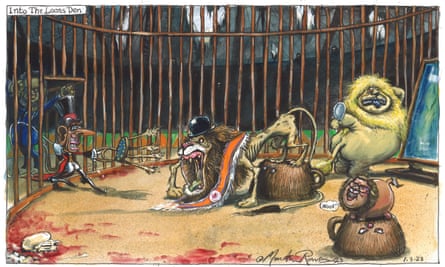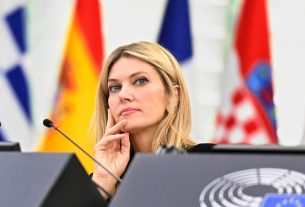Good morning. On Monday, Rishi Sunak tried to persuade parliament and the press that the new Windsor framework would work; yesterday, he turned his attention to the people of Northern Ireland. The deal, hailed by Sunak as a breakthrough, is supposed to address post-Brexit trade problems by reducing checks on goods crossing the Irish Sea.
While Sunak was met with a warm welcome in the House of Commons, the work is not over as the most important voice has not yet approved of the deal. The Democratic Unionist party (DUP) has predictably been guarded about their verdict, insisting that they need more time to understand what the Windsor framework consists of.
Yesterday, No 10 indicated that the government would press on with the deal with or without the DUP’s backing – but without their return to power sharing at the Stormont assembly, it is difficult, as Sunak himself said, to see how it can be viewed as a success.
I spoke to the Guardian’s Brexit correspondent Lisa O’Carroll, and Rory Carroll, the Guardian’s Ireland correspondent, about where politicians, people and business in Northern Ireland stand on the Windsor framework – and what might happen next.
Five big stories
-
Greece | At least 32 people have died and 85 have been left injured after a passenger train collided head-on with a freight train near the town of Tempe in central Greece. Multiple cars derailed and at least three burst into flame.
-
UK news | A couple who disappeared with their baby have been arrested on suspicion of gross negligence manslaughter, as officers searching for the child say fears are growing for its safety. Constance Marten and her partner, Mark Gordon, have not told police the location of the infant or its sex since being arrested on Monday.
-
Iran | Dozens of schoolgirls have been admitted to hospital after a poisoning on Tuesday, the latest in a string of suspected attacks on girls’ schools. The poisonings come more than five months into protests that spread across Iran over the death in custody of 22-year-old Mahsa Amini.
-
Schools | Michael Gove has suggested that parents who fail to ensure their children attend school regularly could have their child benefit payments stopped. Gove said it was necessary to “think radically about restoring an ethic of responsibility”.
-
Nigeria | Bola Tinubu from Nigeria’s ruling party has been declared the winner of the presidential election. Tinubu has defended the integrity of the election and asked for unity after opposition parties disputed results.
In depth: A political victory or a fiasco that backfires?

The DUP’s reaction
There is a lot of pressure for the DUP to agree to the terms of the Windsor agreement, but Jeffrey Donaldson – the leader of the party – has said that while progress has been made, “key issues of concern” still remain. Nonetheless, there is a sense of hopefulness in parliament, says Lisa O’Carroll: “Some people have read [the DUP’s] cautiousness as a positive sign, given that they have reputation for saying no.”
It’s a balancing act for Donaldson between short- and long-term interests, says Rory Carroll: “Short-term, you will have some within the party who will want him to say no, like Ian Paisley Jr, who on Monday said the deal doesn’t cut the mustard. Others might sing the same tune, which would make life quite difficult for Donaldson.”
There is also the looming figure of the Traditional Unionist Voice (TUV), a small rightwing rival that has in recent years been taking some votes from the DUP in elections. “The TUV have already come out against the deal as expected, and there will be a risk for Donaldson that they could now be poised to eat into the DUP vote in the coming elections in May,” Rory says. “While the moves of the TUV will not be a decisive factor for the DUP, it’s certainly something Donaldson will be considering.”
Even though Sunak insisted that this deal has put Northern Ireland in the “most exciting” position it could be in, Donaldson has made it clear that the DUP will not be rushing to any conclusions. The devil, as ever, is in the detail, so it is no surprise that the DUP will be doing a line-by-line legal analysis of the framework to make sure that the new deal does not create more problems for them further down the road. “They genuinely do need to actually study the text,” Rory says. “It’s not just them purely playing for time – they need to do their due diligence.”
What have other parties said?
Similarly, Sinn Féin, the largest party in the Northern Ireland assembly, have said that they will take time to review the deal before they give a definitive judgment. However, they have broadly welcomed the framework, hailing it as an important turning point in this protracted saga. “There’s no question that Sinn Féin will accept it, as will pretty much all the other parties,” Rory says. “It’s a no-brainer.” Unlike the DUP, Sinn Féin has no issue with Northern Ireland being subject to EU law – they have said that the most important thing now is to restore Stormont as quickly as possible, after more than a year of deadlock which began with the resignation of the DUP first minister Paul Givan. Ireland’s taoiseach, Leo Varadkar, has also welcomed the deal, saying that it has provided “workable and durable” solutions.
Public reaction
Rory points out that for most people in Northern Ireland the protocol is not at the top of the list of their concerns: “Bread and butter issues like healthcare and the economy trump the protocol for a lot of people.” Most people, it seems, want to turn the page on this issue – however there are enough unionists who take significant issue with the protocol, and the DUP is aware of that. “It strikes a chord with lots of people because of the sovereignty issue in Northern Ireland,” says Lisa. “And it’s a legitimate complaint: if you’re part of the United Kingdom, why should you have to endure regulations and trade barriers, when the rest of the UK doesn’t?”
In this piece from a loyalist enclave in south Belfast yesterday, Rory hears from residents who are mostly suspicious of the prospect of a deal, and in some cases feel burned by Sunak’s predecessor-but-one: “So far all we’ve heard is a lot of hype and bluster,” David Milliken, 51, tells him. “We had that before from Boris Johnson and he told everyone lies.”
Business leaders have said the new deal is an improvement, with many expressing hope that the framework will bring stability to their industries. One told the BBC’s Good Morning Ulster: “What has come across is actually more beneficial than previously thought … it almost takes us back to pre-Brexit times.”
What’s next?
The big question is what the DUP will do now. While most Tory MPs support the deal, hard-line Brexiters will probably take the DUP’s lead, so, as Jacob Rees-Mogg has suggested, Sunak could, without the support of the DUP, have a rebellion on his hands.
The DUP has said that it may convene on Saturday to discuss the legal verdict, but a final decision could take weeks or even longer. Signing up to the framework, however, is not an indelible decision: “Officials have been stressing that this framework agreement is an organic and dynamic thing that can be changed over time, unlike the protocol which was designed to be permanent,” Lisa says. There will be a continual review process to make sure that the agreement continues to work for everybody. “That’s the critical difference between the protocol and this new arrangement: if the DUP found in the future that it was flawed or faulty, there is a mechanism there to allow the EU and the UK to come back and tweak it.”
The stakes could not be higher for everyone involved. It could be a massive political victory or a fiasco that backfires on Sunak spectacularly. And for Northern Ireland, it could be the difference between the restoration of power-sharing, allowing public institutions to deal with the cost of living crisis – or a political no man’s land.
What else we’ve been reading

-
Daniel Lavelle’s interview with theoretical physicist Ronald Mallett (above) is an emotive look at racism, grief – and time travel. Hannah J Davies, deputy editor, newsletters
-
Steve Coogan’s drama about the paedophile Jimmy Saville is finally set to air this year: Mark Lawson explains why there have been so many delays. Nimo
-
All hail the circumboob! Arwa Madhawi writes entertainingly on the new cleavage trend that’s sufficiently chaotic for the current moment. Hannah
-
A report supporting the theory that coronavirus leaked from a Chinese lab fuelled destructive discussions around how the pandemic began. David Smith digs into how the origins of Covid became a toxic political debate in the US. Nimo
-
Spare a thought for the Gen Z workers whose mastery of TikTok means nothing in an office full of printers and photocopiers, and who are suffering from “tech shame” as a result. Hannah
after newsletter promotion
Sport

Cycling | Twenty-one-year-old Trek-Segafredo cyclist Antonio Tiberi has been suspended from his team and fined €4,000, for fatally shooting a minister’s cat in San Marino. Tiberi said that he was trying out an air rifle and aimed at the cat’s head and fired.
Football | Canadian Soccer Association president Nick Bontis resigned from his position amid ongoing labour disputes between the organisation and the men’s and women’s teams. The women’s side want the same backing at this summer’s World Cup as the men received in Qatar last year, and both teams want to know why their programmes are subject to cuts this year.
Football | A sparse crowd watched as Brighton beat Stoke 1-0, moving them into the quarter finals of the FA Cup. Fulham advanced to their first quarter finals in 13 years after defeating Leeds 2-0. Leicester crashed out after some terrible defending allowed Blackburn to earn a 2-1 win. Phil Foden and Kevin De Bruyne’s brilliant scores gave Manchester City a 3-0 victory over Bristol, pushing City into the next round as well.
The front pages

“NHS £14bn recovery plan already failing to meet targets, MPs warn” – the Guardian’s splash this morning. The Financial Times has “Jaguar owner Tata demands £500mn of aid to build battery plant in Britain”. “Sunak gambles his political career on defying Brexit deal critics” – that’s the i while the Daily Express seems more confident: “Rishi’s Brexit boost for UK”. The Times leads with “Deal is not negotiable, Sunak tells the DUP”. The Daily Telegraph has “Hancock rejected Whitty’s advice on care home tests”. “Police: we fear that their baby has come to harm” says the Daily Mail after missing Constance Marten and her partner were arrested. “Missing baby arrests … ‘Killed’ by their neglect” says the Metro. “Arms of love” – an amputee father can embrace his children again, says the Daily Mirror, after the “medical miracle” of a double hand transplant.
Today in Focus

What the salad crisis says about Britain
Shoppers have been left staring at empty shelves and advised by their government to eat turnips over tomatoes. But the food shortage might be more serious than it sounds, reports Joanna Partridge
Cartoon of the day | Martin Rowson

The Upside
A bit of good news to remind you that the world’s not all bad

When she was younger, Ellie Gibson was a Tomb Raider obsessive. Today, aged 45, she spends more time tidying up after her kids than playing video games. That was at least until she discovered the immensely satisfying PowerWash Simulator, which casts the player as a power-washing entrepreneur tasked with removing dirt from buildings and objects. What’s more, in the game’s Tomb Raider expansion, the mission is to clean Lara Croft’s mansion. As Gibson writes: “PowerWash Simulator was made for me.”
Now Gibson is undertaking a new challenge: attempting to set the Guinness world record for the longest PowerWash Simulator marathon. She will live-stream herself on Twitch cleaning Lara Croft’s mansion for 24 hours straight. In the process, she will be raising money for the Borne charity, which funds research into premature birth.
Sign up here for a weekly roundup of The Upside, sent to you every Sunday
Bored at work?
And finally, the Guardian’s puzzles are here to keep you entertained throughout the day – with plenty more on the Guardian’s Puzzles app for iOS and Android. Until tomorrow.


